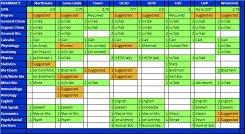Now it's time for the student panel. They had six members of their pledgeclass sit up front, with preset questions. Questions from the audience was opened up afterwards, but unfortunately I couldn't stay because I also had tickets to watch Wicked: A New Musical. (Which was awesome by the way.) For ease of taking notes, I just numbered the panelists, rather than try to remember their names.
---
Student Panel - Real raw and uncut stories at UCSF
Question: Tell us about yourself. [Ok, that's a not a question, but you get it.]
1 - Grew up in SF, went to Lowell High School. Went to UC Berkeley as an undergrad.
2 - Graduated from Berkeley in 2007 as a Bio and Theater major, took two years off to work on pharmacy [to be a better candidate? Or prerequisites, I missed that.] and to act. "And I like bunnies."
3 - Grew up in SF, went to Mills then UCSD as a BioChem/Cell Bio major, with a minor in Healthcare and Social Issues
4 - Grew up in Oakland, went to Berkeley [Lots of Berkeley folks], graduated in 2008 in Molecular Biology, took one year off to work in a hospital.
5 - Grew up in Taiwan, went to a community college first, then UCSD in BioChem/Chem. Graduated in 2004, "So I'm above the average age." Worked for five years for pharmaceutical companies, Genentech [and one other]. "I had a bunny." I've never worked in a pharmacy.
6 - Grew up in SF, went to Lowell High School, then Berkeley in Molecular Toxicology. "I was supposed to be the year of the bunny, but I ended up being born in January, so I'm the year of the tiger."
Q: What attracted you to pharmacy? Why Pharmacy?
1 - I was always interested in the sciences. They were my favorite classes in elementary. When I was 15, there was an opportunity to intern at the UCSF drug production lab, so I tried it out. All the pharmacists and students there seemed really happy. As I found out more and more, I became more and more intrigued. I've been really glad I chose this.
2 - I always liked camping. But when you're out there you always get stung by something or there's poison oak, and my brother had asthma, and I would always freak out. I was also interested in the sciences. I volunteered in a pharmacy and I liked being there with the patients, not all of them are nice, but some of them are, and they'll bring you food. [That probably doesn't make sense to you guys who are reading this, but it made sense when I was there!] You're always learning. There's so many opportunities, so much to learn.
Q: How did you prepare? For pharmacy school.
3 - I'm probably not the best example. I was in my third year when I decided. I joined the UCSD pre-pharmacy society. I got exposure there. I worked discharge at a pharmacy. [That may not be totally right.] I did my research, and talked to relatives. For extracurricular activities, I volunteered for walkathons to raise money for the underprivileged, and danced a lot.
5 - I didn't think I wanted to do it. When I decided, I took classes at community colleges after I graduated. I needed a break from high school. There are things that you do that you are passionate about. Write about that in your personal statement. You might think like you don't have anything to talk about, but if you look back over the years about all the little things you've done, you'll see you've done a lot.
6 - Everything counts. I worked in a bug lab for three years. It doesn't seem related, but just knowing how to do research, and put together a book and presentation... those are skills you'll be using a lot. Put it all in your toolbox. Hopefully it's big and always expanding.
What did you find most challenging?
4 - There are five main areas they look at. Personal statement, interview, academics, extracurriculars, and letter of recommendation. Don't forget to emphasize extracurricular activities. They want to see a track record of serving the underserved communities. They want to see passion. Doesn't have to be pharmacy related experience. Doesn't have to be health related. I tutored for three years. You'll be educating patients as a pharmacist, so it's similar. It doesn't have to be science related. I studied Japanese for three or four years, and mentored foreign exchange students. I think the admission people were interested in that experience.
What's something you wish you would have known?
5 - The personal statement is super important. You're trying to describe yourself in five essay questions. There are 1,300 applicants. Spend a lot of time there. It was challenging for me to be personal because I've been training to be objective. Make sure it's stuff you're passionate about. It could be something simple like taking your grandma shopping every week.
6 - Be organized overall. There isn't one deadline. There are multiple deadlines. There are very similar deadlines. There is a general and supplemental application. I didn't do a good job of that. I only applied to two pharmacy schools. A lot of people do five or more. For USC, I thought the deadline was November 3rd, but it was November 2nd. I came back from a camping trip and it was closed, so I missed it. But I'm glad since I saved some money. [Everyone laughed.]
---
I'm going to cut it off here, and put up part 2 of the student panel tomorrow.






